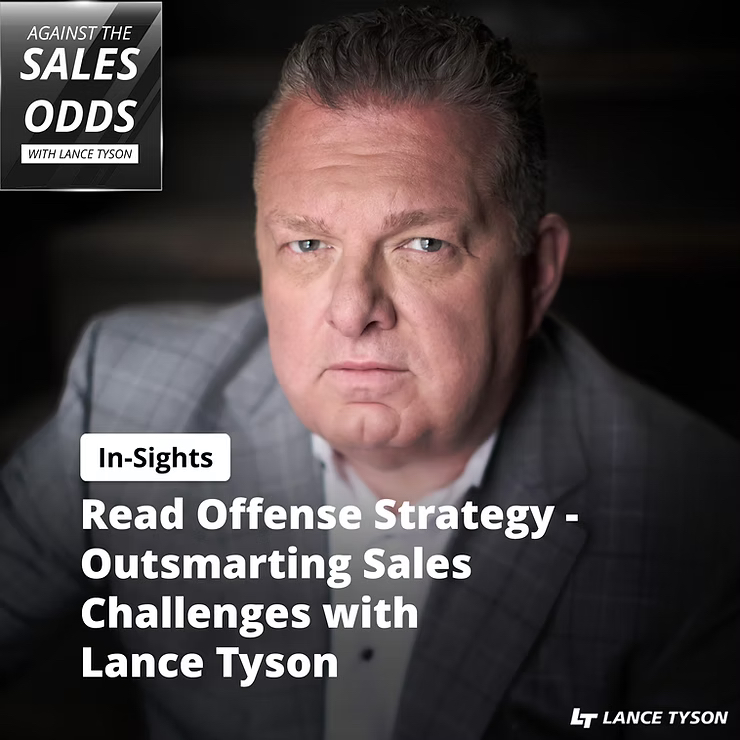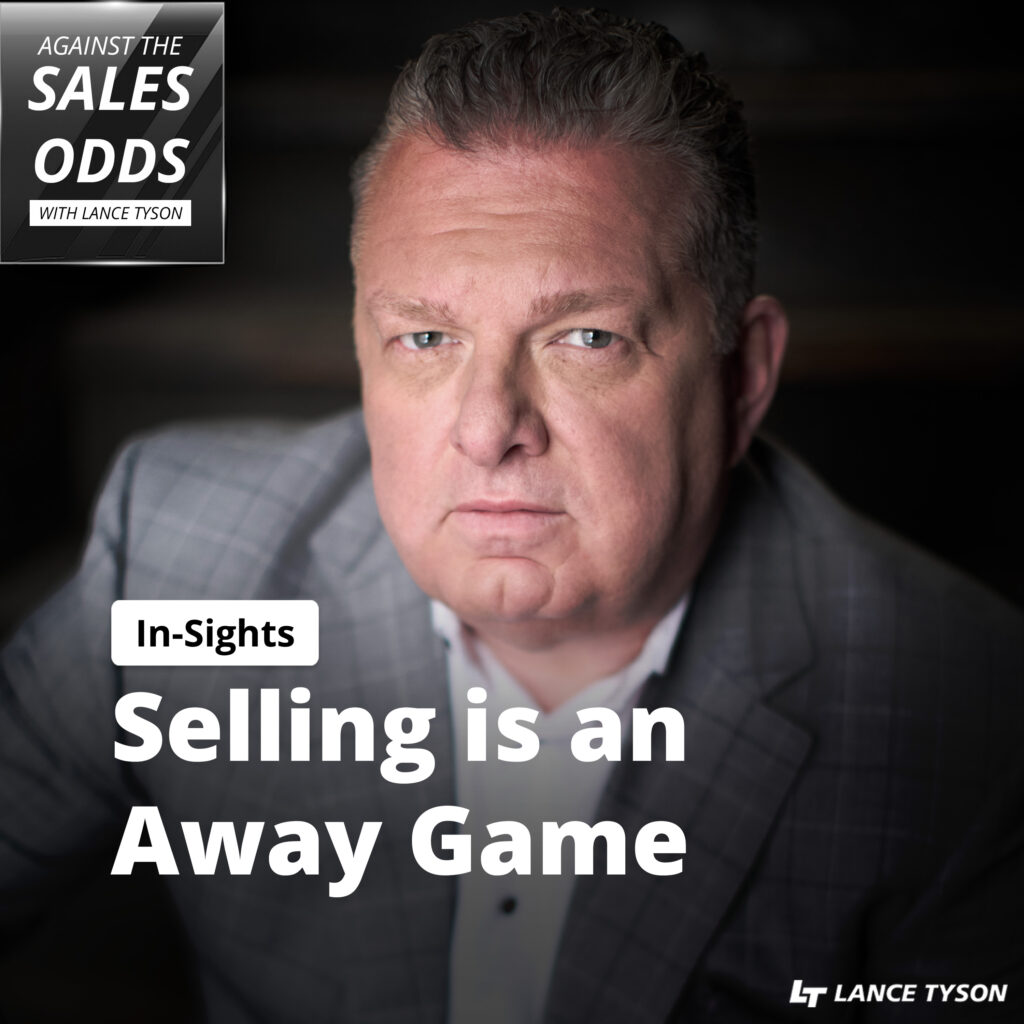In this episode of the In-Sights series, we dive into Lance Tyson’s powerful Read Offense Strategy. Learn how to anticipate your buyer’s moves, adapt your approach on the fly, and close deals smarter, not harder. Perfect for sales pros ready to elevate their game and win on every play.
Lance is the bestselling author of Selling Is An Away Game and The Human Sales Factor.
Check out Lance’s Bestseller Books:
- The Human Sales Factor – https://tysongroup.com/books#thehumansalesfactor
- Selling is an Away Game – https://tysongroup.com/books#sellingisanawaygame
Check out Tyson Group’s Open Enrollment Programs: https://www.tysongroup.com/openenrollment
Download our playbooks: https://www.tysongroup.com/sales-playbooks
Schedule a call with one of Tyson Group’s member: https://bit.ly/41YJW7K
Subscribe to our Newsletter: https://tysongroup.com/#weeklynewsletter
Follow Lance across Social Media: LinkedIn – https://www.linkedin.com/in/lancetyson/ Instagram – https://www.instagram.com/lance_tyson_1/ X – https://x.com/lancetyson
Love the show? Subscribe, rate, review, and share! https://www.tysongroup.com/podcast
—
Listen to the podcast here
In-Sights: Read Offense Strategy – Outsmarting Sales Challenges With Lance Tyson
Decoding The Read Offense: Sales Strategies From Elite Performers
Concept called The Read Offense. If you think about all what you’re saying, there’s Florida State did a study on really what makes a successful salesperson. There’s a good book out there that was written about fifteen years ago. It’s actually a competitor of ours. It was called The Challenger Sale. The guy that runs the sales center at Florida State, his name is Leff Bonney. He was trying to challenge the study that was done by this book.
What they did is they surveyed 783 salespeople across a bunch of industries. They talked to the salespeople about what their preferred sales methodology was. They said, “A methodology for all of you is what’s your approach. How do you take the plane off the aircraft carrier?” They start to find an outlier of what the top people were doing. They did a second study, and they tested the outlier claim. I had an article in Fast Company about it, but here’s how it breaks down.
Basically, what they start to see is the top salespeople do, and they still do it in every industry, is it’s called The Read Offense. I am not a Tom Brady fan, and I am not a Bucs fan. I have some graphic artists on my team that thinks they’re funny. I haven’t gone back, so just don’t get offended by the team there. No offense given. None should be taken.

Read Offense Strategy: Following up on leads often requires six to eight touches, even after initial inquiry, just to get them back on the phone.
If you’re a quarterback, you get a play called in and the offense coordinator, whoever calls the play, then you get up to the line of scrimmage and then you look at the defense and you go, “That play’s not going to work. I’m going to call them audible. I’m going to change it up because what they’re giving me is not going to work.”
I have this situational awareness. All of you need that also. In order to change the play, you have to have some fundamentals down, fighter pilots. There’s something that fighter pilots are taught in dogfighting. It’s called an OODA loop. All of our modern combat troops are taught OODA loops. It’s situational decision-making.
An OODA loop stands for Observe, Orient, Decide, and Act, OODA. You’ve got to be in the moment. I think Emma brought up the thing with Sarah in Memphis that was OODA looping. Sarah is trying to find nine seats together as opposed to orienting herself to the situation and go, “Why the hell am I doing this? Why is this person even calling? Why now? Why the Sixers?”
How Did SEAL Teams Succeed? The Power Of Prepared Scenarios In Sales
That’s situational awareness. On a podcast I was on a couple of years ago was with a guy that like SEAL Team 3 or something. He and I were going back and forth and the pregame. I said to him, “When you were on SEAL teams, what was the success rate of SEAL Team 3 when you were on it?” He goes, “We were 80% successful in our missions.”
You cannot deal with sales with blinders on.
I go, “When you prepared for a mission, how many scenarios did you practice for?” He said, “Our prep for is 6:00 to 8:00.” I said, “What percentage of time did what you practiced actually was the mission itself?” He goes, “Less than 30.” Why? It’s all situational awareness. Same in an operating room. You’re a Doc and you’re doing like a knee replacement or you’re doing a shoulder surgery or whatever it is, or like a routine operation.
Navigating “Maybe”: The Key Questions For Effective Sales Follow-Up
You’re going to deal with somebody’s health or the situation, maybe an artery gets nicked or something, or somebody’s blood pressure drops, you got to make a decision right there to change it up. I know the fundamentals. Does that make sense to everybody? This is what you’re being asked to do. You cannot deal with these things as blind with blinders on, even Adam and his example saying, “I got this here. It is not working here.” I’m not saying it’s a massive problem.
I don’t want to exploit what he said, but he’s going like, “This isn’t matching up. I might have to have some other situational awareness here to change what I’m doing in the moment.” All of you know, and you can apply this, here’s what we know, even when you’re following up on leads pre pandemic, whether you’re a prospecting or following up on leads, there’s a certain amount of attempts you need to take to make to get somebody to respond to you. Would you agree with that?
Most of the time following up at leads, we find it’s taken 6 to 8 touches, even if somebody inquired to us to even get them back on the phone, or even in a conversation. You guys are like playing M&M all the time, you’re getting one shot, one opportunity to deal with somebody. You’ve got to make a decision in the moment because, go back to what somebody said earlier, I’m in this perpetual follow-up loop, if not. Yes or no?
You have to have situational awareness and the fundamentals down to make a move.
Even in your current situation, you have to have situational awareness. You have to have the fundamentals down to make a move. If somebody says, “Naomi, I’m interested in this.” You’ve got to have situational awareness. What are some specific things that are causing you to be interested on the flip side? Why wouldn’t you do it? You’ve got to be okay with asking that question, because you might not get them back on the phone again, or somebody says to Zoe, or says to Luke, “This sounds good. Let’s follow up in a week or so.”
Ready To Close? Pre-Planning And The Art Of The Sales Ask
Are you going to go over? Are you just going to land on the fact that it sounds really good and you’re going to follow up? What are you following up on? Are you following up on a decision? I have a call right after this. I got the lead from Rock. It’s the company that does video boards in stadiums, and companies called ANC. I already have a plan with our salesperson at noon, what I’m specifically going to ask them, and how I’m going to ask them.
We’ve already pitched them. I’m literally going in and going, my first question out of the gate, I’m not even going to any room at all. I’m just going to say, “What are your thoughts on moving forward with this?” I’m going to make him dance from there. That’s my come-out question. He’s going to have to react to me because he’s not going to be ready for it early. He’s going to be thinking like, we’re going to do a lot of like back and forth.
I’m going to ask, I’m going to come out and just say, “How much time do you have today? I know you’re really busy, I’m going to kind of play it up.” FYI, too, when you hear me talk, I don’t sound as crass as I probably do now when I sell. Don’t get caught up with the 55-year-old grumpy guy on the phone here. When I sell, I put it on. I layered on, I got my good people skills. I’m thinking that I’m coming across with human relation principles is like all you should but I have a certain thing I’m going to do. I’ve already taken Brandon on my team, who’s on that call with me.

Read Offense Strategy: High performers have a dominant style—but it shifts based on the situation. They change strategy to get the best odds. High performers are agile.
Brandon has the same experience you do. He’s worked at the cabs, he’s worked at the Devils, he worked at MSG, and he was in sales and leadership. We talked right before this and said, “Guys, what’s the plan?” I said, “The plan is we know he’s looking at the proposal. We know what today is, we’re going to ask him for the order.” The only objection we’ve gotten to this point is that he has to talk to his stakeholders internally.
I’m to ask for the order. I’m going to be ready to ask any concerns they have if I need it. I already have a plan. That’s how I got to have that situational awareness. All of you do because numbers don’t mean anything. It’s just you get time with people, you get to know where you’re to go. That’s your OODA loop or your read offense. Now, here’s what we know as salespeople, all of you need. If you look at high performers in any industry, high performers have a dominant style that’s based on the situation.
When loss rates when accounting for in both situations and strategy, salespeople know what they’re doing. High performers are likely to change their strategy based on that they’re going to get them the best odds. High performers and agile, bottom line, in that study, agile and situational sellers. That means when you approach a sale, you’re going to be agile.
Important Links
- The Challenger Sale
- The Human Sales Factor
- Selling is an Away Game
- Tyson Group’s Open Enrollment Programs
- Download our Sales Playbooks by Tyson Group
- Schedule A Call With One of Tyson Group’s Member
- Subscribe to Tyson Group’s Newsletter
- Lance Tyson on LinkedIn
- Lance Tyson on Instagram
- Lance Tyson on X
- Tyson Group Podcast




